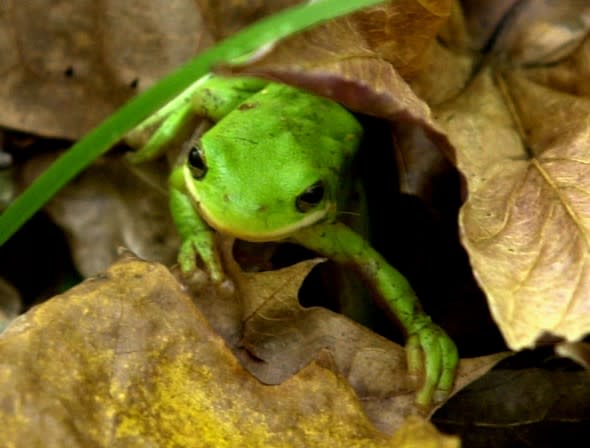Here's why alligators are purposefully freezing themselves in North Carolina swamps
Not having to move for months at a time might sound like a dream to some, but for reptiles, it's a means of survival. Brumation, which is essentially the reptilian equivalent of hibernation, is a dormant period when cold-blooded reptiles temporarily shut down all activity to conserve energy.
As was recently seen in a video from The Shallotte River Swamp Park in North Carolina, alligators brumate by allowing their bodies to freeze in a swamp with their noses poking through the ice. By allowing themselves to freeze in place, the gators can lower their body temperatures and slow their metabolisms enough to survive the freezing winter temperatures.
Brumation is an innate behavior for reptiles, meaning that their bodies tell them to do it naturally, regardless of environment. The alligators in North Carolina were able to sense the upcoming cold by recognizing the differences in water temperature. But because brumation is innate, some captive reptiles like pet lizards or snakes may enter brumation when their biological clocks say to shut down.
Unlike hibernation in mammals, brumation is not a sleeping period for reptiles. Reptiles in brumation still need to drink water and may wake for several days at a time before returning to brumation.
Different reptiles brumate in different ways. Some tortoises burrow themselves as deep as 6 feet into the ground to wait out seasons. Garter snakes huddle into groups to brumate, using their combined body heat to help each other survive.
Amphibians that aren't very skilled at burrowing, like tree frogs, can sometimes be frozen solid during colder winters. Incredibly, these cold-blooded frogs will even stop the beating of their hearts and production of their lungs until warmer weather returns.

A green tree frog looks up from a pile of leaves as it makes a migratory trek from a nearby swamp, across the scenic LaRue Road to a den area for winter hibernation near Wolf Lake, Ill., in Union County, Tuesday, Oct. 21, 2003. On this U.S. Forest Service road in far southern Illinois, officials call it the only road the government owns that's closed to vehicle traffic in order to protect reptiles and amphibians as they cross. (AP Photo/Charles Rex Arbogast)
As for the recently-gone-viral alligators in North Carolina, park General Manager George Howard said that the alligators first got into the water last week as a result of the Arctic blast that hit the East Coast.
Howard said the cold front brought the alligators into the swamp, where they perfectly timed the freezing of the water. According to the park, all 18 of the park's alligators were frozen in the ice.
"Are you ready for the cold? Be prepared and think ahead," Howard said in a video released by the park. "Our 18 American alligators are thinking ahead, as they poke their noses through the ice here in January 2019."

